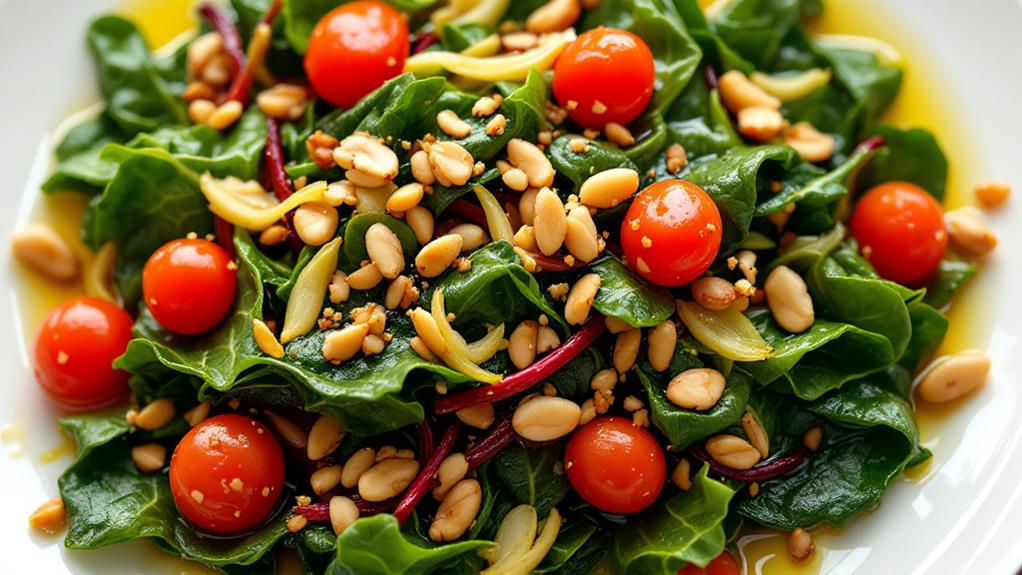Chard Attack on a Plate! Why You Should Add Swiss Chard to Your Diet

You should add Swiss chard to your diet because it packs a powerful nutritional punch while being low in calories. Each cooked cup offers vitamins A, C, and K, plus antioxidants that fight inflammation and support your immune system. With its high fiber content, it aids digestion and helps manage your weight. It's also a great source of magnesium and potassium, promoting heart health and good sleep. Versatile in the kitchen, you can enjoy it raw in salads or cooked in a variety of dishes. Curious about its full potential in your meals and lifestyle? Uncover more benefits.
Nutritional Powerhouse
In regards to packing a nutritional punch, Swiss chard stands as a true powerhouse. When you add this leafy green to your diet, you're not just filling your plate with color; you're embracing a low-calorie, nutrient-dense option that fuels your body. With just 35 calories per cooked cup, Swiss chard is an excellent choice for those watching their calorie intake.
One of the standout features of Swiss chard is its impressive vitamin K intake. Each serving delivers a whopping 635% of your daily needs, fundamental for maintaining strong bones and proper blood clotting. This makes Swiss chard a nutritional powerhouse that you shouldn't overlook.
But that's not all. Swiss chard is also packed with important antioxidants like polyphenols and carotenoids, which help combat oxidative stress. By including it in your meals, you're taking a proactive step towards reducing the risk of chronic diseases.
Additionally, this leafy green is rich in necessary minerals, providing 10% of your calcium needs and 47% of your magnesium requirements per cooked cup. Its high fiber content supports digestive health, helping you maintain a balanced diet while managing weight effectively.
Health Benefits
Packed with an array of health benefits, Swiss chard is a must-have improvement to your diet. It's exceptionally high in vitamin K, providing a whopping 635% of the Adequate Intake (AI) per cooked cup. This vitamin is vital for blood clotting and maintaining strong bones, helping you ward off related health issues. Furthermore, Swiss chard is rich in antioxidants, including polyphenols and carotenoids, which combat oxidative stress and may reduce your risk of chronic diseases like cancer.
The nutritional value of Swiss chard doesn't stop there. With roughly 4 grams of fiber per cooked cup, it aids in digestion, promotes regular bowel movements, and helps stabilize blood sugar levels. This is particularly beneficial if you're managing diabetes, as it can help you maintain better control over your blood glucose.
In addition, Swiss chard is a good source of magnesium and potassium, which are important for heart health. These minerals help regulate blood pressure and reduce the risk of heart disease. In fact, diets rich in leafy greens like Swiss chard are associated with an 11% reduction in heart disease risk per serving, further highlighting its cardiovascular benefits.
Heart Health and Fiber

Although often overlooked, Swiss chard plays a significant role in promoting heart health thanks to its high fiber content. Each cooked cup of this leafy green packs about 4 grams of dietary fiber. This fiber is vital not just for maintaining bowel regularity but also for feeding the beneficial bacteria in your gut. Consuming enough fiber can reduce your risk of heart disease by 25-30%, making Swiss chard an excellent choice for those looking to protect their hearts.
In addition to fiber, Swiss chard is rich in potassium and magnesium, two important minerals that help regulate blood pressure. Maintaining healthy blood pressure is key to reducing the strain on your cardiovascular system and lowering the risk of heart-related issues. By including Swiss chard in your diet, you're taking a proactive step towards better heart health.
Furthermore, diets rich in leafy greens like Swiss chard have been linked to an 11% reduction in heart disease risk per serving. The high fiber content also improves satiety, supporting weight management. This combination of benefits makes Swiss chard a powerful ally in your quest for a healthier heart. So why not include it on your plate?
Cooking and Storage Tips
Swiss chard is a versatile and nutritious addition to your meals, but to get the most out of this leafy green, it's crucial to know how to select and store it properly. Start by choosing lively, crisp leaves with firm stalks, steering clear of any wilting or discoloration. Once you've got fresh Swiss chard, proper storage is key. Wrap the leaves in a damp cloth and place them in a plastic bag before refrigerating. This method keeps your Swiss chard fresh for up to five days.
When you're ready to cook, rinse the leaves thoroughly in cold water to eliminate any dirt or grit. Remove tough stems for a better texture. There are several cooking methods you can investigate. Sautéing, steaming, and boiling are all excellent choices that preserve the chard's nutritional value. Boiling for about three minutes is particularly effective.
If you're thinking about long-term storage, consider blanching your raw Swiss chard. After blanching, freeze it to preserve its goodness for up to six months. These storage tips allow you to enjoy Swiss chard's benefits whenever you desire, keeping it as a staple in your healthy diet.
Buying Guide

To make the most of Swiss chard's nutritional benefits, it's crucial to start with the best quality produce. When you're following this buying guide, keep an eye out for lively, crisp leaves paired with bright, firm stalks. Avoid any bunches that look wilted or have discolorations, as these signs indicate they're past their prime. Opt for organic Swiss chard whenever possible, especially if you're enjoying the leaves raw. This choice helps minimize your exposure to pesticides, ensuring a healthier dining experience.
Swiss chard is a versatile green available year-round, but buying it in season guarantees the freshest and most flavorful options. When selecting your bunch, give the stalks a gentle squeeze. They should feel firm and full of life; soft stalks can signal overripeness and a loss of quality. Once you've brought your leafy gems home, knowing how to store Swiss chard is key to preserving its goodness. Wrap these greens in a damp cloth and place them in the refrigerator. This method will help maintain their freshness for up to five days, ensuring you always have nutrient-packed vegetables ready for your next meal.
Potential Risks
When incorporating Swiss chard into your diet, it's important to be mindful of certain potential risks. Although this leafy green offers numerous health benefits, it also contains high levels of oxalates, which can contribute to the formation of calcium oxalate kidney stones. If you're prone to these stones, moderation is key to avoiding complications. Moreover, Swiss chard is rich in vitamin K, so if you're on blood thinners, maintaining a consistent intake is vital to guarantee your medication remains effective.
Be aware of the following potential issues:
- Kidney stones: High oxalate content may increase the risk of stone formation.
- Vitamin K: Can interfere with blood thinners, necessitating a stable intake.
- Allergic reactions: Though uncommon, symptoms like hives, itching, or swelling can occur.
- Digestive discomfort: The high fiber content might lead to issues in sensitive individuals.
- Health conditions: Consult a healthcare provider if you have concerns about nutrient density and oxalates.
Ultimately, while Swiss chard can be a healthy supplement to your diet, being aware of these risks and discussing them with a healthcare professional can help you enjoy it safely.
Delicious Recipe Ideas

Exploring the culinary potential of Swiss chard opens up a world of flavorful and nutritious dishes you can easily incorporate into your meals. This versatile vegetable is a powerhouse of nutrients, and cooked Swiss chard contains crucial vitamins and minerals that make it a healthy enhancement to any dish. Start by sautéing Swiss chard with garlic and olive oil for a quick side dish that maintains its lively nutrients and adds flavor to any meal.
For breakfast, add Swiss chard to your quiches or frittatas. This not only increases your vitamin K and fiber intake but also gives your morning meal a delightful twist. If you're looking for a nutrient-packed drink, blend Swiss chard into smoothies with fruits like banana and mango. You'll enjoy a revitalizing beverage that masks its earthy taste while delivering a health punch.
Incorporate Swiss chard into hearty soups and stews, allowing it to wilt and enrich your dish without overpowering other flavors. To enjoy it raw, create a colorful salad by mixing Swiss chard with fruits, nuts, and a light vinaigrette. This provides a crunchy texture and a wealth of antioxidants to your meal.




